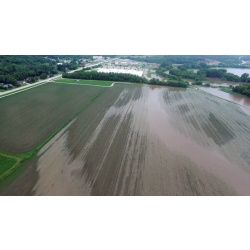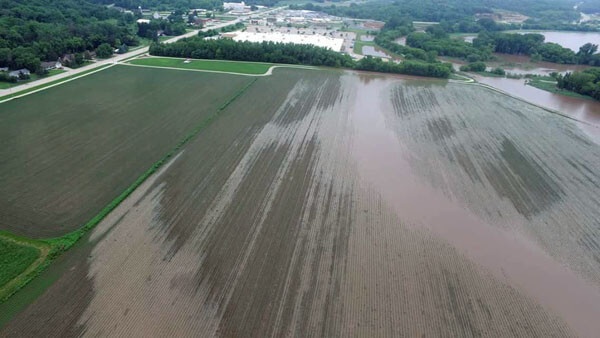
Letter to the Editor: "The overarching lesson for city policy makers as they ponder a rezone application to allow another mega-big box store in the river's floodplain? We shouldn't make the fatal mistake of assuming that the floods of 1993, 2008, 2016, and 2018 were just coincidental"
Posted: Sun, Jun 24, 2018 1:02 PM
(The following Letter to the Editor has been submitted by Tim Wagner of Decorah):
"I was one of the many who attended a packed-house meeting of the Decorah Planning and Zoning Commission on June 11th regarding the planned vote over rezoning an existing floodplain for a new Menard's store.
What was noticeable about the commission's discussion on June 11th was little if any mention of climate change. It seems, however, that before the P&Z, the Board of Adjustment or the City Council have any more discussion about this issue, the topic of climate change and what it actually means for Iowa should be at the forefront of their deliberations.
What was noticeable about the commission's discussion on June 11th was little if any mention of climate change. It seems, however, that before the P&Z, the Board of Adjustment or the City Council have any more discussion about this issue, the topic of climate change and what it actually means for Iowa should be at the forefront of their deliberations.
The Iowa Climate Change Advisory Council was convened in 2007 and 2008 to examine the effects of climate change on Iowa and make recommendations to help the state become more prepared. From the Iowa Department of Natural Resources website, where the Council's full reports and recommendations are located, a brief summary addresses just two components of climate change – precipitation and temperature--and what Iowans must expect.
Increased Precipitation
--Increased frequency of precipitation extremes that lead to flooding.
--An increase of 8 percent more precipitation from 1873 to 2008.
--A larger increase in precipitation in eastern Iowa than in western Iowa.
--Increased frequency of precipitation extremes that lead to flooding.
--An increase of 8 percent more precipitation from 1873 to 2008.
--A larger increase in precipitation in eastern Iowa than in western Iowa.
Higher Temperatures
--Long-term winter temperatures have increased six times more than summer temperatures.
--Nighttime temperatures have increased more than daytime temperatures since 1970.
--Iowa's humidity has risen substantially, especially in summer, which now has 13 percent more atmospheric moisture than 35 years ago, as indicated by a 3- to 5-degree rise in dew-point temperature. This fuels convective thunderstorms that provide more summer precipitation.
The overarching lesson for city policy makers as they ponder a rezone application to allow another mega-big box store in the river's floodplain? We shouldn't make the fatal mistake of assuming that the floods of 1993, 2008, 2016, and 2018 were just coincidental. The climate is changing drastically, with severe floods happening more frequently, and the costs to recover will continue to go up.
--Long-term winter temperatures have increased six times more than summer temperatures.
--Nighttime temperatures have increased more than daytime temperatures since 1970.
--Iowa's humidity has risen substantially, especially in summer, which now has 13 percent more atmospheric moisture than 35 years ago, as indicated by a 3- to 5-degree rise in dew-point temperature. This fuels convective thunderstorms that provide more summer precipitation.
The overarching lesson for city policy makers as they ponder a rezone application to allow another mega-big box store in the river's floodplain? We shouldn't make the fatal mistake of assuming that the floods of 1993, 2008, 2016, and 2018 were just coincidental. The climate is changing drastically, with severe floods happening more frequently, and the costs to recover will continue to go up.
Let's learn from past mistakes, from the science, and from those who have been most affected and will likely be affected again. Our community is far more important than "retail synergy" and Menards' profits. Please make the informed choice in this matter."
Copyright © - decorahnewsarchive.com. All rights reserved.| Terms Of Use Statement.

Site designed and maintained by Iroc Web Design Services©.
Your Small Business Web Design Solutions.™
Site designed and maintained by Iroc Web Design Services©.
Your Small Business Web Design Solutions.™


